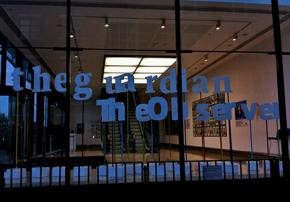When the press gives in to the spooks
Belfast Daily Telegraph columnist remembers past conflicts between the press and the government--and that the government almost never blinks first.
THE DECOMMISSIONING of hard drives and memory chips in the basement of the Guardian newspaper's offices in King's Cross in London on June 20 will have filled any British spies in the vicinity (and there must have been a few) with a warm sense of nostalgia.
As two sturdy journalistic fellows set about their task with lump hammers and angle grinders, the thoughts of the watching spooks must have drifted back to the hills and/or glens of Ireland and the supervised destruction of republican guns. Such a simpler operation, that.
This time, it wasn't armaments which the authorities wanted put beyond use, but something possibly more elusive and certainly more dangerous--facts that governments don't want us to know about things being done in our name. The hard drives had contained some of the secret files leaked by Edward Snowden detailing the vast scale of the National Security Agency's surveillance operation against the U.S. public and the extent of British participation in the same exercise.
The Guardian reported that chaps from Government Communications Headquarters (GCHQ) had told editor Alan Rusbridger, "You've had your fun, now we want our stuff back." Rusbridger had explained that the information they wanted was also being held on files outside the UK, and that pummeling computer parts in London would make no difference to anything.

Nevertheless, the government's men wanted their material back and threatened to go to court if the newspaper didn't comply. So Rusbridger agreed to supervised decommissioning. "Once it was obvious that they would be going to law, I preferred to destroy our copy," he said in the Guardian.
Readers would be forgiven if they began to suspect that there is an element of play-acting in all this. If the men from the ministry had seriously wanted to take physical possession of the equipment holding the files, why didn't they? Why didn't they put the hard drives under their arms and tell the journalists wielding the hammers to back off?
On the other hand, why, upon being told that GCHQ would go to court if necessary, didn't Rusbridger respond: Well, let's see the color of your writ, then? Is this not the sort of fight commonly associated in these parts with the townland of Scarva?
THE GUARDIAN has some form in this area. Journalists of a certain vintage will recognize the name of Sarah Tisdall. She was a young officer in the Foreign Office in 1981 when she came across a number of documents setting out a strategy for Defense Minister Michael Heseltine to mislead parliament and the people about the circumstances of the arrival of U.S. cruise missiles in Britain. Alarmed by what she read, Ms Tisdall photocopied the documents and sent them anonymously to--where else?--the Guardian.
Naturally, the paper splashed them across the front page. The government then went to court demanding not that the documents be handed over--they already had the originals--but that the source be revealed. The argument was that while the documents might not put national security at risk, the sort of person who would leak such a document might well, given the chance, leak a document which did put national security at risk.
The courts bought this argument and issued an order. The Guardian complied. The documents led predictably and directly to a photocopying machine, and the machine to Ms. Tisdall. She was sentenced to six months, released after four.
We could trawl, too, through the case of WikiLeaks founder Julian Assange, who, it can fairly be argued, has done more than any other individual anywhere to shine a light on the hidden places where governments plot the subversion of the sovereignty of the people. WikiLeaks' huge trove of information was released to a number of outlets, the most prestigious being the Guardian.
Assange is now holed up in the Ecuadorean embassy in London, unwilling to go to Sweden to face sex charges because he is convinced that if he did, he would be rendered onwards to the U.S., where leading politicians have called for him to be charged with treason and executed on account of his role in the WikiLeaks revelations.
The house style of the Guardian when referring to Assange these days is a sneer.
What's clear in all these cases is that when it comes to a clash between the press defending the people's right to know and the government's determination to keep those people in the dark, one side is invariably in deadly earnest, and the other, too often, merely throwing shapes.
First published at the Belfast Daily Telegraph.


